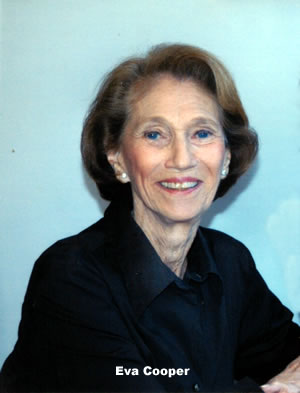Holocaust Museum Honors Survivor in New York
By Jennifer Horowitz
 The United States Holocaust Memorial Museum in Washington, DC, has bestowed its National Leadership Award on Eva Cooper at its 2014 New York Tribute dinner recently. The annual awards “are presented to an outstanding individual(s), foundation, or corporation in recognition of their exceptional contribution to benefit the community in ways that advance the values and mission of the Museum” and are given in several cities each year; the Honorable Michael B. Mukasey also received the award at this year’s New York event.
The United States Holocaust Memorial Museum in Washington, DC, has bestowed its National Leadership Award on Eva Cooper at its 2014 New York Tribute dinner recently. The annual awards “are presented to an outstanding individual(s), foundation, or corporation in recognition of their exceptional contribution to benefit the community in ways that advance the values and mission of the Museum” and are given in several cities each year; the Honorable Michael B. Mukasey also received the award at this year’s New York event.
Education Update had the opportunity to speak with Cooper before the dinner, and she shared her thoughts and experiences with us.
“I’m very honored,” Cooper said, explaining that the award is in recognition of her longtime involvement with the museum. She began her involvement when the museum was still in the planning stages. “My mother and I, twenty three years ago, flew to Washington, DC,” for a meeting which took place in an office where architectural renderings of the planned museum were on display. She and her mother attended the museum’s groundbreaking ceremony, gave testimony for the archives, and were at the grand opening, where President Bill Clinton, Elie Wiesel, and other luminaries took part.
Why support the Washington museum rather than the similar-themed New York Museum of Jewish Heritage? It was a difficult decision, but the Coopers felt that the location in the capital of the United States would draw bigger audiences and thus impact more people. Still, Cooper maintains some level of involvement with a number of Holocaust museums, including the Nassau County Holocaust Museum, and the Museum of Tolerance on Manhattan’s 42nd Street.
Cooper herself is one of the many “hidden children” who survived the Holocaust thanks to heroic individuals who concealed the children’s identities – or the children themselves – in homes, barns, convents, and anyplace else where they could keep the youngsters safe. There are thousands of such former children – a gathering organized by Anne Shore of the ADL drew attendees from all over the world. Cooper was ten years old when the Nazis entered her native Budapest, and she and her parents went into hiding.
What enabled these hidden children – and sometimes adults – to survive, when others, most famously Anne Frank, came to a tragic end? Cooper attributes this survival to the loyalty of her protectors, who did not forget the meaning of the word “hidden.” “Friends gave warning” when her location was at risk and it was time to move to a new hiding place. “We were not betrayed.” (Anne Frank’s hiding place was betrayed by a burglar hoping to trade information for a lighter sentence.)
Cooper did keep in touch with her rescuers, at least at first. Now, after seventy years, not many of them are left.
Cooper’s thoughts on education about the Holocaust are clear. As an example, she told us about an ongoing program at the renowned Bronx Science high school. The program continues to be a success even though the school’s demographic, which was once heavily Jewish, is mostly Asian now. Museum programs, tours, and Holocaust study units in schools are all very important – “the more education, the better,” says Cooper. Furthermore, a museum like the U.S. Holocaust Memorial is more than just a museum; it is also a means of prevention as it educates the public. Like Bronx Science, the museum in Washington sees an increasing percentage of non-Jewish visitors – including groups from the police force and fire departments – so the message is reaching a wide variety of people.
“We owe it to the millions who are not here to speak for themselves,” says Cooper.#
